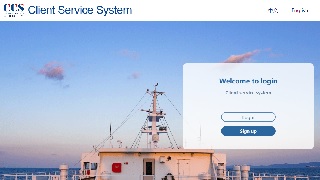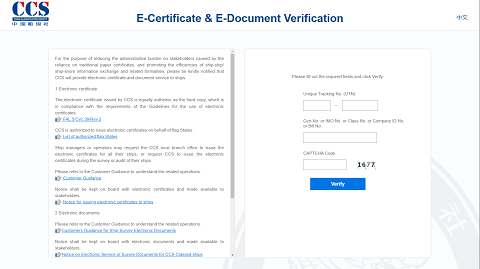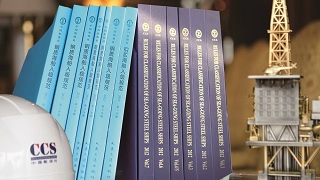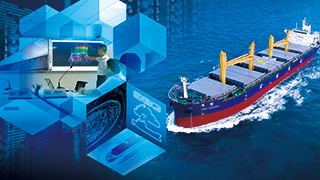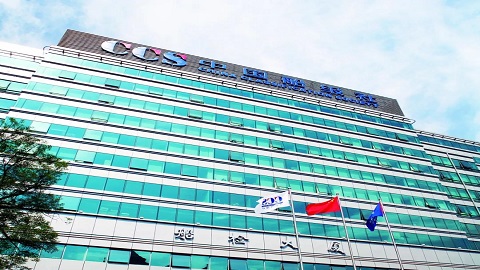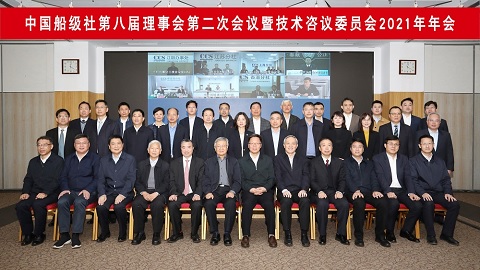01/01.1970
Customer Personal Information Protection Policy
of China Classification Society
China Classification Society
(hereinafter referred to as CCS) attaches great importance to the protection of
personal information. This Policy sets out the policies for processing your
personal information collected by CCS website and service platforms. We will
use the information strictly in accordance with this Policy and our user terms
and conditions.
In this Policy, personal information means any
information recorded electronically or by other means that can identify a
specific natural person or reflect the activity of a particular natural person,
either alone or in combination with other information, including but not
limited to the name, date of birth, ID number, address, telephone number, fax
number, email address and online history of a natural person.
By applying to CCS website for
the use of the website or applying for or accepting the services of CCS by
other means, you acknowledge that you have read and understood this Policy, and
accepted our rules and policies regarding your personal information, and you
explicitly agree that we collect, store, use, process, transmit, provide,
disclose and delete your personal information in accordance with this Policy. We will process your personal
information in accordance with relevant laws of the People’s Republic of China
when it is necessary, with justified reason, and in good faith.
If you are a user within the
scope of the General Data Protection Regulation (GDPR), we will also fulfill relevant
obligations. If you change your mind in the future, you may withdraw your
consent to use your personal information in accordance with this Policy.
If you do not agree to this Policy,
we will not refuse to provide services to you because you do not consent to our
collection of your personal information. You can still visit the CCS website
and use its basic service functions.
I. Information collected by us and the method used by us to collect the
information
In order to provide you with
our services, you need to provide the personal information necessary for the
services. If you do not provide your personal information, we may not be able
to provide you with corresponding services.
We will only collect information that is necessary, specific, explicit and
legitimate for the services you have chosen, and will not process the
information further in a manner that is inconsistent with these purposes. Depending
on the services you have chosen, we may collect one or more of the following
information (which is not exhaustive), whether or not it is personal
information:
1. Information you provide to
us. You provide us with relevant
information about you by using our services or contacting us by phone, email or
other means. This includes information provided by you when registering for our
services, such as your real name, email address, mobile number, fax number,
country, company, address, which will help us register for you so that you can use
our service.
2. Information generated and
displayed when you use the services. When you use our services, we will automatically
collect certain information about you, including the IP address and information
about your use of our services, such as date and time stamps. We will also
collect and store your personal information each time you log into the CCS
service system, for example, the information generated when you communicate
with us via phone, email or in-app support communication tools.
3. Relevant information about
you which is collected by us during the cooperation process. When we cooperate, you provide
us with relevant information, such as your ID number, nationality, country of residence,
professional qualifications, etc., by providing services, signing cooperation
agreements, conducting surveys and promotional activities (including those
entrusted to a third party) to provide better services.
4. Your personal information
which we may obtain through a third party. We may collect your personal information, such as your
name and contact information, by participating third party trade fairs or from network
providers, in order to provide you with information about products and
services.
Please note that a third party may have its own special personal
information protection policy and explain how to collect and process your
personal information. Such policy does not constitute a part of this Policy.
You need to carefully read and decide whether agree with its personal
information protection policy or not.
II. How we will use and store
information
1. Use of information
We will use the personal information by the following means in accordance
with relevant laws:
(1) We use collected information to provide customers with service and
support, carry out satisfaction surveys of our products and services or other
investigations in order to evaluate and improve our services, and inform you of
our additional products and services etc.
(2) We will use the collected information for big data analysis. For
example, we use the collected information to analyze and develop statistical reports
that do not contain any personal information. We may disclose big data analysis
information that does not contain identification content after statistical
processing.
(3) We will ask for your consent in advance when we intend to use the
information for other purposes not covered by this Policy, and use the
information collected for a specific purpose for other purposes.
2. Information storage
We will continue to store your personal information while you use our
services or cooperate with us. The storage period will be the minimum time
necessary to achieve the above purpose. If you choose to close your account or
voluntarily delete the above information, we will delete or anonymize your personal
information. When your personal information storage exceeds the minimum period
required for the above purpose, we will delete or anonymize your personal
information, except as otherwise provided by laws and administrative regulations
or compulsively required by relevant regulatory authorities according to law.
3. Information processing
We will not process the personal information provided by you while you use
our services or cooperate with us.
III. How we will use Cookies
and Web Beacons
When you use our website, we may also collect tracking information such as
the IP address you have used and the pages you have visited on our website.
These information processing activities depend on your consent to the use
of cookies and similar technology when you visit our website. We do not use
Cookies for any purpose other than those stated in this Policy. You can manage
or delete Cookies.
IV. To whom we provide your
information
1. We will not sell any personal information to a third party.
2. We may sometimes disclose your personal information
to a third party in order to provide you with the products and services you may
need. We may disclose or share your information in the following cases
(including but not limited to):
(1) when we might share your personal information with CCS overseas
wholly-owned subsidiaries;
(2) for the purpose of CCS receiving audit carried out by the flag State
Government or a third party;
(3) Law enforcement agencies, regulatory agencies,
government agencies or other judicial institutions and organizations. We may
disclose your information in accordance with the requirements of laws or if we
have sufficient reasons to believe that the disclosure is reasonable and
necessary:
in order to abide by legal
obligations, procedures or requirements;in order to fulfill our Terms
of Service, your contract and other agreements, policies and standards, including
investigation of any possible violations;in order to detect, prevent,
or otherwise address security, fraud, or technical issues;in order to protect the
rights, property or security of us, our users, third parties or the public
(including exchanging information with other companies and organizations to
prevent fraud) as required by law or permission;other situations specified in
laws and regulations.
(4) In case certain services are provided by a partner as authorized by
CCS, your personal information will be shared between CCS and the partner in
accordance with the description in this Policy. For example, CCS will authorize
the partner to carry out satisfaction survey and CCS must share your personal information
with the company conducting the survey.
(5) Disclosure to other organizations with your consent.
V. Security measures
We abide by the requirements of all relevant data security and personal
information protection laws and regulations to collect, use, store and transmit
user information and undertake to adopt the following security measures to
protect your personal information.
1. We adopt measures of appropriate physical, administrative and technical
safeguards to protect your personal information from unauthorized access,
disclosure, use, modification, damage or loss. For example, we use encryption
technology to ensure the confidentiality of data; we use certified security
mechanisms to protect against malicious attacks; we deploy access control
mechanisms to ensure that only authorized personnel can access personal information;
we will do our best to protect your personal information, but please note that
no security measures can be impeccable.
2. If we need to share your personal information with a third party or
transfer it to a destination outside of your country, we will require the third
party to process data in accordance with this Policy and other relevant data
protection requirements through a contract or agreement, so as to fully protect
your personal information security.
3. We will cultivate the awareness of data security of employees and carry
out the training and assessment of security capabilities, and strengthen
employees' awareness of the importance of protecting personal information.
4. In the event of leakage of personal information, we will initiate an
emergency plan, take appropriate remedial measures and notify the relevant
regulatory departments in a timely manner according to relevant requirements. If
personal information leakage may pose a high risk to your rights and freedoms,
we will notify you of the basic information and possible consequences of the information
leakage by means of on-site notifications, emails, etc., and the actions we
have taken or will take. When it is difficult to notify one by one, we will release
an announcement in a reasonable and effective manner.
VI.
Your rights
1. You can access and correct
your personal information
You have the right to request access to your personal information held by
us. If you believe that any information we hold about you is incorrect or
incomplete, you can ask us to correct it. When you update your personal
information, you will be asked to verify your identity before we process your
request. Once we have sufficient information to process your request to access
or correct your personal information, we will respond to your request in a
timely manner.
More details related to your personal information in the service account
of this website can be accessed and changed by logging in to your account with
your device.
2. You can request to delete your personal
information.
You are entitled to asking us to delete your personal information. We will
process by taking corresponding steps, including technical means. This right
may be limited; for example, if you ask us to delete information that is required
by the law to be retained or the retention of that information has convincing legitimate
rights.
3. You can request to transfer your personal
information.
You are entitled to receiving your personal information in a structured, general
and machine-readable manner or requesting us to transfer your personal information
to other data controllers.
4. You can request to restrict or object to the processing of your
personal information.
In specific cases other than the purpose of storage, you are entitled to
restricting or objecting to the processing of your personal information by us.
We will evaluate your request for restriction or objection. If we have legal
reasons (e.g. for maintaining a legal statement, or providing protection for
other people or the retention of that information has convincing legitimate
rights), we may use such personal information again. We will notify you before
we cancel the restriction.
You can exercise your rights above by contacting us at csm@ccs.org.cn.
VII. How we process the personal information of minors
Our services
are not suitable for use by minors (under 16 years of age). Minors are not
allowed to use the services for any purpose. We do not deliberately allow
minors to provide any personal identity information. Since we are unable to
identify the age of the web visitors, if the parent or guardian has any reason
to believe that the minor has submitted personal information to us without
prior consent, please contact us to ensure that such personal information is deleted.
VIII. Contact us
If you have any
comments or questions about this Policy, or if you have any questions about
collecting, using or disclosing your personal information by CCS, or if you have a complaint about how we process your personal
information, please contact us at the address below, we will process your
request after verifying your identity. If you are not satisfied with our reply,
you have the right to lodge a complaint to the data protection agency where you
live or where you believe the violation has occurred.
China Classification Society
Email: csm@ccs.org.cn
Address: 9 Dongzhimen Nan Da Jie, Dongcheng District, Beijing
Post: 100007
For customers from European Union Exclusive Economic Zone, please contact:
Hamburg Branch, China Classification Society
Email: ccshb@ccs.org.cn
Address: Kuehnehoefe 1, D-22761 Hamburg, Germany
or:
Athens Branch, China Classification Society
Email: ccsat@ccs.org.cn
Address: Skouze 26, 18536 Piraeus, Greece
IX. Update of customer personal
information protection policy
We can change the Customer Personal Information Protection Policy without
notice. If we make any changes to this Policy, we will release an updated
policy here with the date of the amendment. We advise you to check this page
frequently for any changes to this Policy.
This Policy was last updated on 10 October 2022.

